27+ Sample Job Offer Letters
-
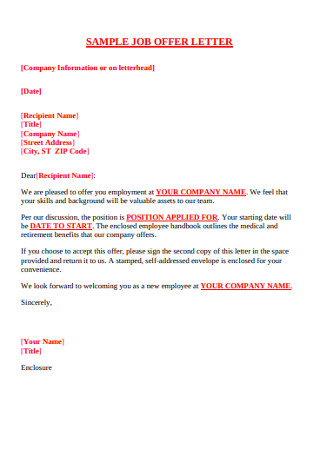
Sample Job Offer Letter
download now -
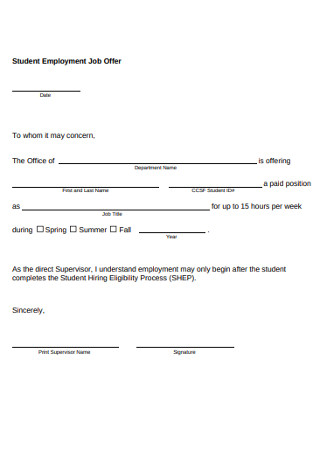
Student Employment Job Offer Letter
download now -
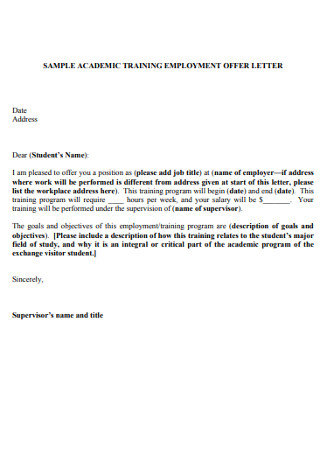
Sample Academic Training Job Offer letter
download now -
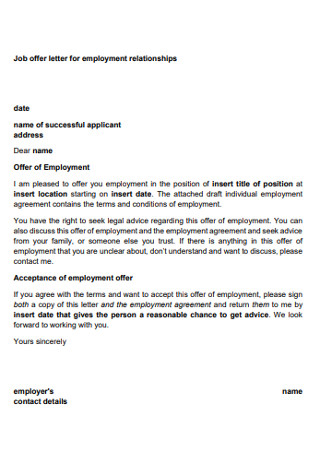
Job offer Letter for Employment Relationships
download now -
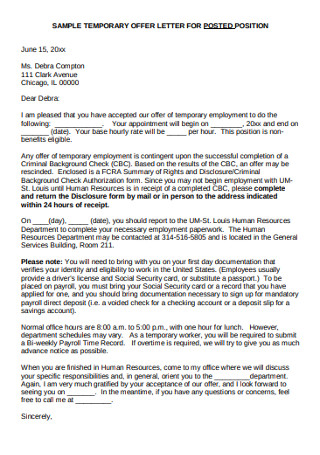
Sample Temporary Job Offer Letter
download now -
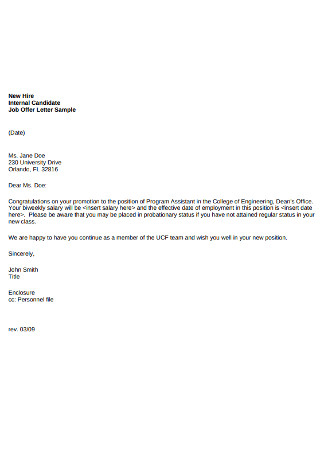
Sample Internal Candidate Job Offer Letter
download now -
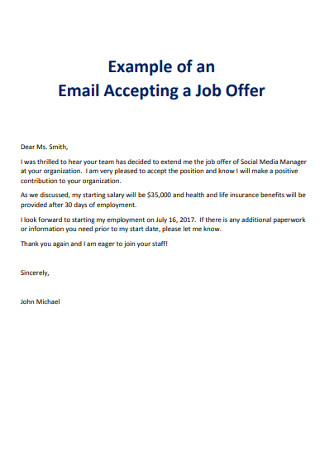
Email Accepting Job Offer Letter
download now -
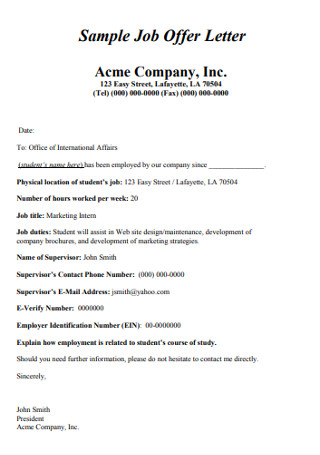
Sample Company Job Offer Letter
download now -
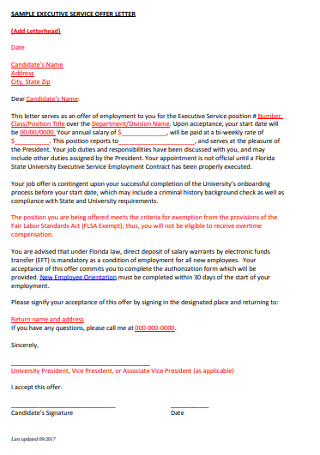
Sample Excutive Service job Offer Letter
download now -
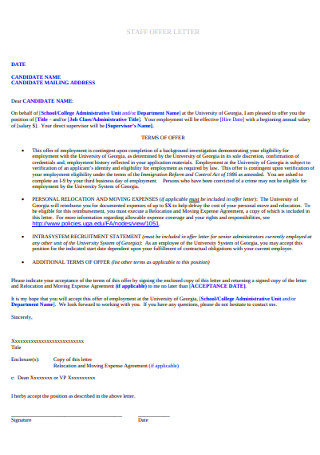
Staff Job Offer Letter
download now -
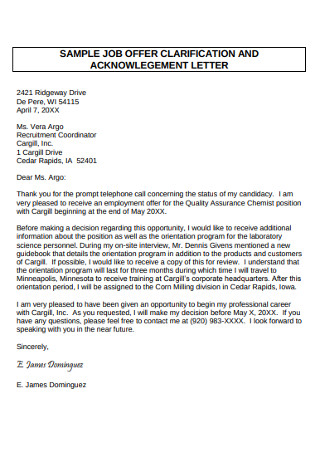
Sample Job offer Clarification and Acknowledgement Letter
download now -
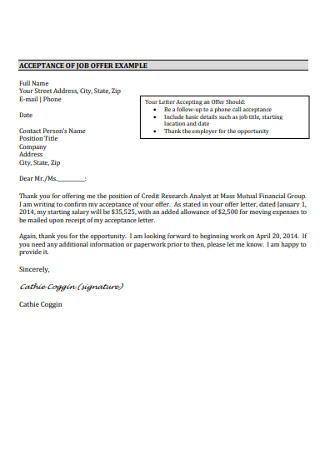
Acceptance of Job Offer Letter Example
download now -
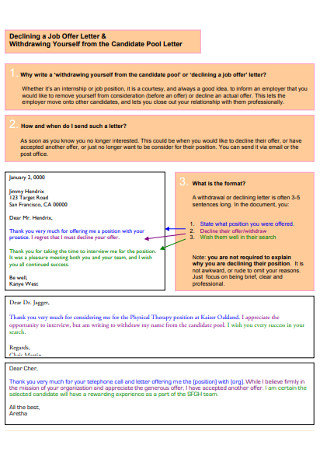
Candidate Pool Job Offer Letter
download now -
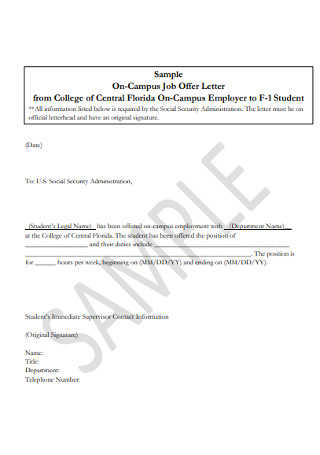
Sample On-Campus Job Offer Letter
download now -
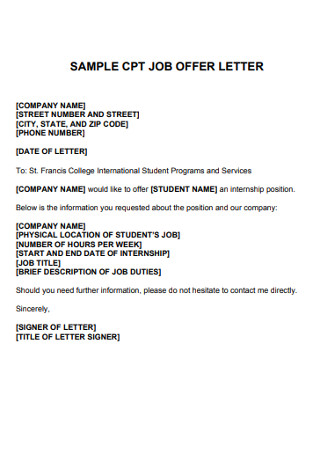
Formal Job Offer Letter
download now -
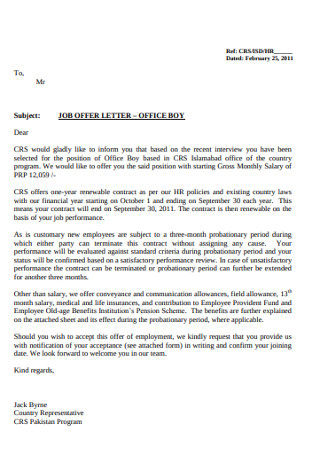
Office Boy Job Offer Letter
download now -
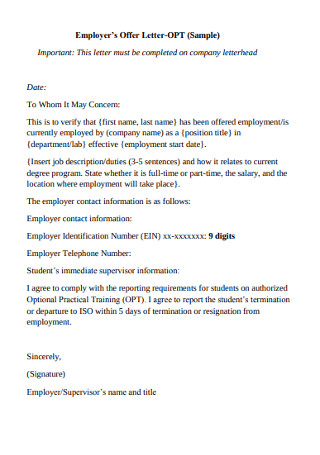
Sample Employer’s Job Offer Letter
download now -
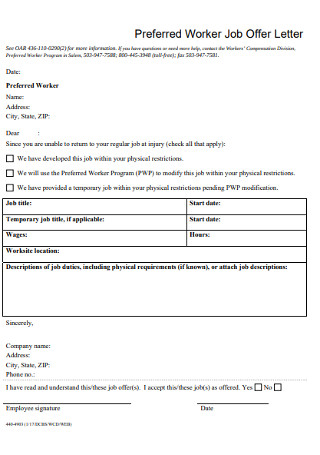
Preferred Worker Job Offer Letter
download now -
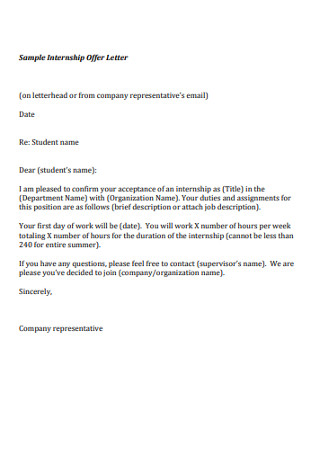
Sample Internship Job Offer Letter
download now -
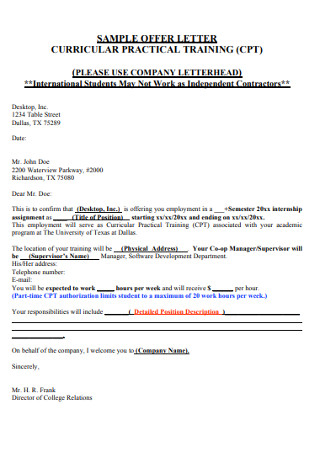
Sample Job Training Offer Letter
download now -
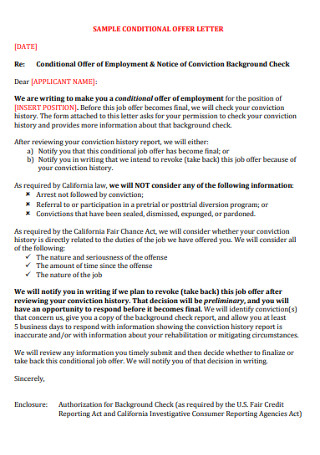
Sample Conditional Job Offer Letter
download now -
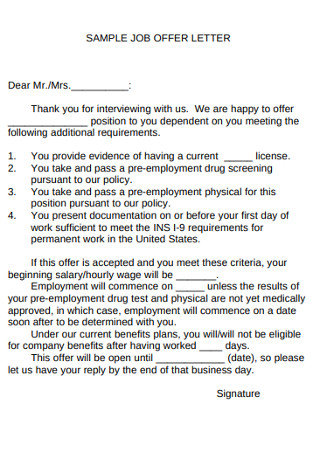
Simple Job Offer Letter
download now -
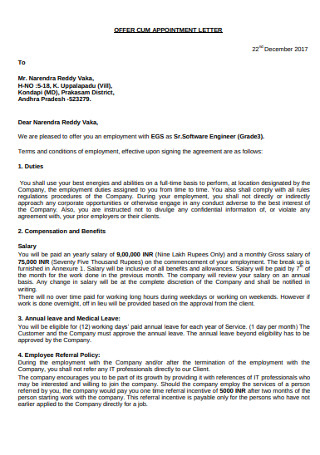
Job Appointment Offer Letter
download now -
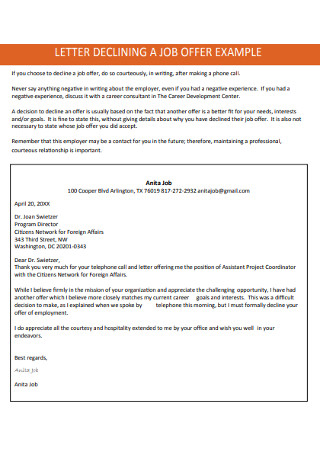
Declining Job Offer letter Example
download now -
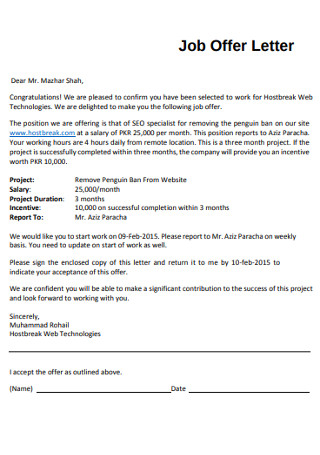
Printable Job Offer Letter
download now -
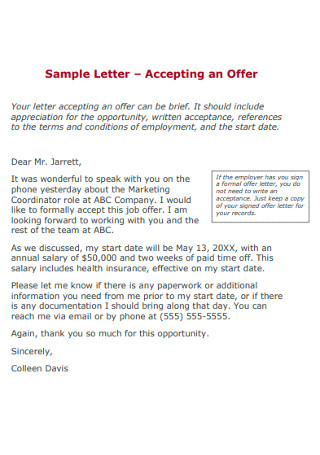
Sample Accepting Job Offer Letter
download now -
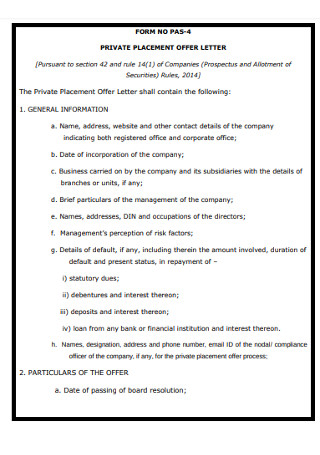
Private Placement Offer Letter
download now -
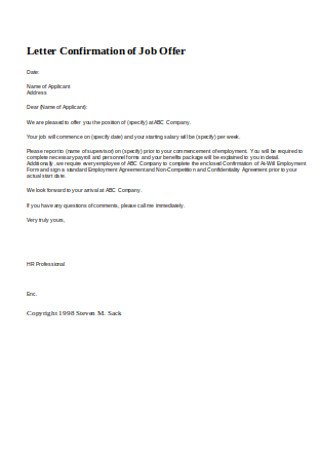
Letter Confirmation of Job Offers
download now
What Is a Job Offer Letter?
A letter of offer contains the provisions of employment for a new employee. It includes the salary increase, benefits, and other pertinent information that will assist you in deciding whether or not to accept the position. As a candidate, you may receive a verbal job offer over the phone or in person, followed by an official offer letter. Alternatively, you may receive an offer letter before being invited for an interview. If you receive a job offer letter after an interview, reviewing its entirety before accepting or declining the position is essential. After signing and returning the acceptance form, it becomes legally binding! If the company’s offer includes a non-compete clause, read it attentively and ask questions about anything unclear. If necessary, you can also negotiate the salary with recruiters or hiring managers; however, don’t expect too much room for negotiation at this stage of the hiring process, as most companies have established budgets for hiring new employees based on experience with similar roles within the organization’s structure and culture.
Benefits of a Job
Society has a preconception that self-employment and entrepreneurship are more prestigious than traditional employment applications. Although entrepreneurs’ contributions to the economy cannot be ignored because their businesses produce jobs, this does not imply that they should be held in high regard. While many people are led to believe that being self-employed entails imbibing cocktails on a beach in the Maldives while working from a laptop, this rarely occurs in reality. Most entrepreneurs and self-employed individuals work longer hours than conventional, full-time employees. If you are not cut out for entrepreneurship, you can create a career working for a company. You may be tempted to believe it sounds half as interesting as being self-employed. If you are still intrigued, the benefits of having a job are listed below.
Important job offer considerations
There are many factors to consider when evaluating a job offer when pursuing a new professional opportunity. Comprehending these factors can assist you in deciding whether to commit to a company, as well as in comparing two competing offers. The more elements you consider when choosing, the more information you have to guide your selection. The following are examples from the list.
1. Base pay and Benefit Package
The remuneration or hourly wage is typically the first consideration when reviewing a new job offer. Typically, an employer provides this information when making an offer. It is essential to compare the income offered by a potential employer to your financial needs. You can negotiate a higher rate to supplement an initial offer. Also, your salary is one of many economic benefits your employer may offer. The value of supplemental benefits packages may be substantial. Benefits can include direct and indirect financial incentives, such as stock list options, retirement plans, and health insurance.
2. Working hours and Commute
When evaluating a job offer, it is also essential to consider the required weekly work hours. Both longer and shorter hours can be advantageous under the proper conditions. For a salaried position, a job offer with a shorter work week increases your hourly pay, allowing you to experience more free time or supplement your income statement with a second job. Employment with longer hours may be desirable when paid hourly because it offers more significant weekly compensation. How you commute to work each day can significantly impact your job satisfaction and daily life. For example, a job with a short commute may give you more free time, but a longer commute to a job you love may be worthwhile.
3. Work and Responsibilities
Understanding your preferred working style can help you locate a job that fits your preferences. Considerations for your work style include your preferred work environment and skill set. Finding a work style that corresponds with your choices can substantially positively affect your overall job satisfaction. The duties and responsibilities of your job can be one of the most essential factors in maintaining your professional happiness. An ideal job provides a variety of duties you are interested in and sufficient work to keep you engaged while maintaining reasonable expectations. Consider both the difficulty of your prospective responsibilities and whether or not they are exciting and enjoyable enough to complete each week.
4. Job Title and Career Advancement
When evaluating an employment offer, your official position title at a company can be a relevant factor. Your job title confers prestige and clarifies your position within the organization. Obtaining a position with a higher title than your previous position demonstrates career advancement and can be advantageous for future promotion agreements or job searches. Also, when accepting a new position, consider the long-term implications for your career. A position can contribute to your professional advancement in three ways. The most direct way to advance is to accept a promotion position from your current one. It would help to investigate the potential for advancement within your prospective new employer.
How to Accept a Job Offer
The fact that a company has expressed interest in hiring you is undoubtedly encouraging, but you should proceed cautiously. You must know how to interact with prospective employers before you accept the position. Accepting a job offer on the spot is not always the best course of action, and you must be confident that you are making the best decision before verbally committing and signing the job offer. Take these measures to increase your chances of success:
1. Inform the Employer That You Saw the Job Posting
Once you receive a job offer, demonstrate your enthusiasm for the position to the prospective employer. Your response to the request will reveal your nature as an employee and set the groundwork for your relationship with your new employer. However, it would help if you had sufficient time to evaluate and comprehend the terms of the offer to make an informed choice. Be wary of an employer who pressures you to decide immediately. Be sure to notify the employer of your decision to accept or decline the offer, as it may be withdrawn before you do so.
2. Evaluate the Job Offer
Examine the compensation, benefits, incentives, paid time off, and bonuses after a job offer. Utilize online resources and tools to compare the remuneration being offered to that of comparable positions at comparable companies to determine if it meets market or industry standards. Evaluate each benefit to ensure it meets your requirements. If, for example, the salary is below your expectations, but you will receive a generous paid sabbatical and have the option to work remotely, the position may still be appealing. Determine whether you must complete training, obtain certifications, or pass an examination or test before you can begin working.
3. Make a Counterproposal
If the offer falls short of your expectations, consider making a counteroffer. Begin by expressing your interest and expressing your appreciation for the offer. Then, describe how your experience will benefit the organization and how you will contribute to its success. Next, provide a counteroffer based on your research and the prevalent market standards, demonstrating the compensation range you believe is more appropriate for you and your experience level. However, be prepared for the company to reject your counteroffer.
4. Inform Additional Prospective Employers
If you applied to multiple companies and received numerous job offers, you must notify them when you accept an offer from another organization. Write a brief email expressing your gratitude for the offer but your desire to withdraw from consideration for the position because you have accepted a position with another organization.
5. Reject an Employment Offer
Once you have decided to decline a job offer, email the employer to thank them for the opportunity and inform them that you cannot accept. Sending an email allows you to maintain a positive relationship with the employer if you apply for another position with the same company.
FAQs
How do you start an application letter and end it?
The introductory paragraph should introduce yourself and your application. Two paragraphs explaining why you are an excellent candidate and your motivation for applying. Employer-directed call to action to close the paragraph. Your signature and list of attachments.
What is salutation in a job application?
Using the proper salutation in a letter demonstrates reverence and professionalism. The salutation appears at the opening of a letter to identify the recipient.
What is an introduction in a letter?
A letter of introduction is a piece of writing that explains who someone is. You may compose an introductory letter for a job to introduce yourself or someone else to a new colleague, customer client, department or project team.
A compelling offer letter is crucial because it can enhance brand image, attract top talent, reduce the likelihood of job offer rejection, establish clear expectations, and provide legal protection. Using a job offer template enables you to meet all of these requirements.
